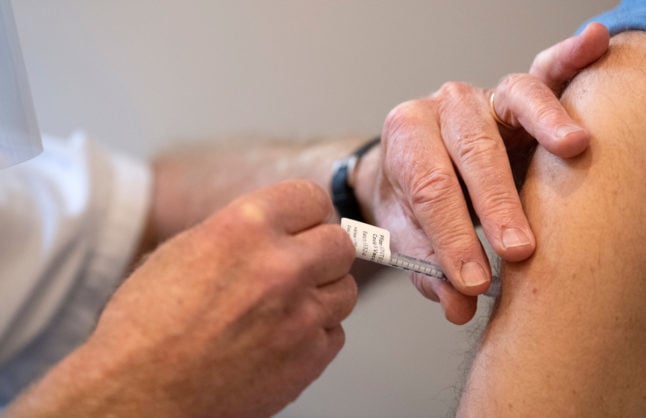It is possible to get vaccinated against Covid at any time, but the Public Health Agency recommends that people generally wait until after November 7th, when an updated vaccine against the virus will be available. This is also to coincide with the start of seasonal influenza vaccinations and because the agency believes that the timing will be ideal to get those at risk vaccinated before the infection peak.
The Covid vaccine is free for everyone and the flu vaccine is additionally free for over-65s and people who belong to risk groups (see below for more information). People who don’t fit this category can still get the Covid vaccine for free at any time, but they have to pay around 200-400 kronor to get the flu vaccine, depending on where in Sweden they live. They will likely also have to wait a few weeks after the launch of the seasonal flu vaccination campaign on November 7th until everyone who needs the flu vaccine has had a chance to get it.
How to book a time for the Covid vaccine or booster varies depending on which Swedish region you live in.
Some regions may send out reminders to people in risk groups, but in other regions people have to contact health centres themselves.
Here’s how it works in Sweden’s three biggest regions as an example: In Stockholm, you can book a time in the region’s Alltid öppet app, contact your health centre or a vaccination centre directly, or visit a drop-in vaccination centre. In Västra Götaland, you can book a time online here or contact a health centre. In Skåne, you can book a time online, visit a drop-in centre or call a health centre.
The best way to find the regional rules is to go to the Covid vaccine page on national healthcare website 1177.se and choose your region (välj region) at the top of the page. If you don’t have a Swedish personal identity number, it’s usually best to call a health centre directly.
Here are the specific Covid vaccine recommendations for all age brackets:
Under-18s
Sweden no longer has a recommendation in place for children and teenagers aged 12-17 to get vaccinated against Covid. The Public Health Agency recommends that under-18s only get vaccinated in individual cases on a doctor’s specific recommendation.
People aged 18-49
There’s no longer any recommendation to get vaccinated against Covid for people aged 18-49 who don’t have an underlying health condition. However, people who belong to this group and would like to get vaccinated may do so, and the vaccine is free for them.
If it’s a booster, at least nine months must have passed since the last dose.
See below for information for over-18s with an underlying health condition, including pregnancy.
People aged 50-64
Unvaccinated people aged 50-64 are recommended to get one dose of the Covid vaccine this winter.
There’s no general recommendation for vaccinated people in the same age bracket, but the same rules as above apply to them: the booster dose is free and nine months must have passed since the last one.
People aged 65-79 and over-18s with an underlying health condition
People aged 65-79 are recommended to get a dose of the Covid vaccine this winter, regardless of whether or not they have previously been vaccinated. If they’ve had confirmed Covid-19 after August 1st and are in good health, they can choose not to get a booster dose, but if there’s any doubt whether or not they actually had Covid, they too are recommended to get a dose of the vaccine this winter.
If people in this group got vaccinated ahead of the autumn before the updated vaccine was available, they may get another dose, but at least three months have to pass between the doses.
The same recommendations apply to people who are aged over 18 and belong to a group especially at risk of developing serious Covid infection. These groups include pregnant people (after week 12) and adults with conditions such as chronic heart or lung disease, obesity, liver or kidney failure, diabetes, and people with weakened immune systems due to illness or ongoing medical treatment.
The flu vaccine is available for free for over-18s with underlying health conditions, including pregnancy, and over-65s and you can get both vaccines at the same time. The influenza vaccination season will start from November 7th, although there may be regional variations.
People aged 80 or older
People who are older than 80 or live in care homes for the elderly are recommended to get vaccinated against Covid this winter. If they’ve already had a booster this autumn, they may get another dose once the updated vaccine is available, at least three months after their last dose.
This guide is meant to be helpful and was correct to the best of our knowledge at the time of publication. If in doubt about anything regarding your medical situation or vaccine recommendations, always speak with a healthcare provider. You can’t book a vaccine via Sweden’s national healthcare helpline 1177, but you can call them for advice in Swedish or English.



 Please whitelist us to continue reading.
Please whitelist us to continue reading.
The Omicron-updated vaccine is now available in Stockholm and Uppsala at VaccinDirect. https://vaccindirekt.se/nya-covid-vaccinet-i-stockholm-och-uppsala/